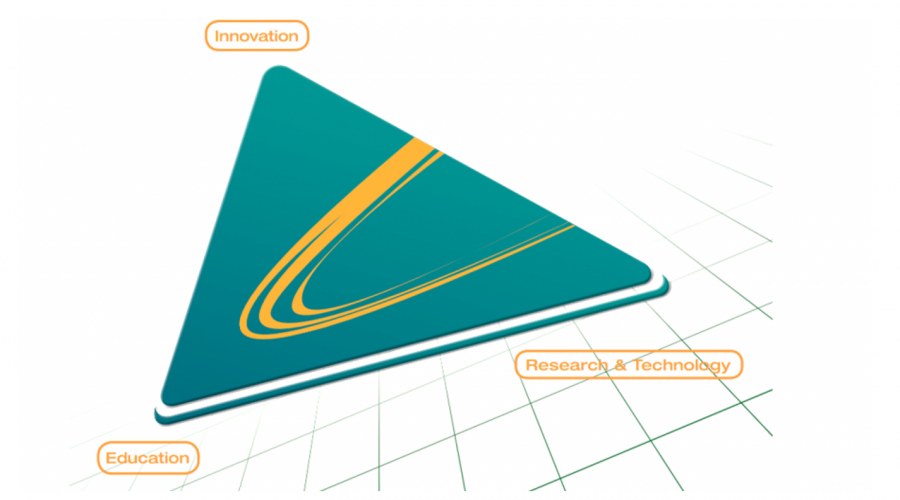
The level of research results produced in the country, the participation of Greek researchers in competitive EU Research & Development (R&D) programmes, the contribution of the National Strategic Reference Framework (NSRF) to Greek expenditure on R&D, the collaborations between those producing knowledge and those implementing it or embedding it in products and services as well as current crisis conditions are some of the topics examined and analysed in the National Documentation Centre’s (EKT) new study, ‘Research, Education, Innovation. Dimensions of the Knowledge Triangle in Greece.’
Over the last decade, the knowledge triangle has become one of the key innovation tools with which to improve innovative potential and, ultimately, the economic development of a country both nationally and regionally. The Organisation for Economic Co-operation and Development (OECD) favours a systematic approach, focusing on strong links between the various actors involved in the knowledge triangle, to capture and compare the innovation systems of its member states. To that end, through the working group ‘Innovation and Technology Policy’ and the Committee for Scientific and Technological Policy, the OECD asked member states for an initial report on the knowledge triangle, particularly the synergies of universities and/or research centres with the business sector.
The two-part publication ‘Research, Education, Innovation. Dimensions of the Knowledge Triangle in Greece’ analyses aspects of how the knowledge triangle operates in Greece and covers the overall outcomes of this synergy. Part one is an overview of the dimensions of the knowledge triangle in Greece, while part two presents relevant case studies from three universities: the Aristotle University of Thessaloniki, the University of Crete and the Athens University of Economics and Business.
The overview focuses on the role played by Higher Education Institutes in research, education and innovation, and their interaction with other participants in the knowledge triangle. It further highlights data on the funding of higher education and the public-private financing mix, the national dimension of knowledge triangle activities - particularly the level of co-operation with regional authorities -and the importance of strategy for smart specialisation in research, technology and innovation towards 2020.
The three Higher Education Institutes mentioned in part two were selected according to size, geographical location and their experience in working with the business sector and other knowledge intensive organisations.
According to the survey and combined with other data (quantitative and qualitative) selected to give a complete picture of the synergy between the three sides of the knowledge triangle in the country, it can be seen that:
- despite the deterioration of macroeconomic indicators in recent years and the fact that Greece continues to have a low ranking among EU member states, national expenditure on R&D increased as a result of the 2007-2013 NSRF funding
- based on the latest R&D statistics (2015) the intensity indicator for R&D as a percentage of GDP is 0.96%.
- over 82,000 personnel are engaged in R&D activities, with the majority being employed in tertiary education
- Greek universities, research centres and Technical Education Intstitutes (TEI) conduct important research mainly using public funding, regular NSRF funding and the EU’s competitive programmes for R&D
- the country’s research output is of a high standard when evaluated on academically
- the participation of Greek researchers in the EU’s competitive programmes for R&D, eg the Framework Programme (2007-2013), is also high given that the country has received capital exceeding 1billion euro, the equivalent of 2.2% of the total community financing
- 10.5% of enterprises with product or process innovation have established working relations with a university or research centre
However, the outcome of these collaborations between those who produce knowledge and those who implement it or embed it in their products or services (ie between researchers/universities and the business community) is not evident in the overall economy. The disparity between the high level of research results and their poor commercial exploitationappears to be particularly applicable to Greece. International efforts to tackle this disparity is an essential tool of economic reconstruction.
This publication concludes that the Higher Education sector is the main research producer, playing the key role in education and the development of the potential of human resources, however, its contribution to innovation is, for the present, relatively limited. Although the Greek higher education system relies heavily on the State in terms of funding, it does seek for funds from elsewhere, especially amidst the crisis, either through co-operative research projects or self-funding.
To achieve that, the Higher Education sector aspires to find alternative sources of funding, particularly through the so-called ‘third mission’, which would lead to increased links with the real economy and national production. In this context, the current funding partnership between the European Commission and Greece for 2014-2020 (EU Structural Funds) is based on smart specialisation and entrepreneurial discovery with the ultimate aim of strengthening the partnerships of Higher Education Institutes with mainly regional but also national businesses.
As an institution, EKT has been active for a number of years in fostering synergies between the three sides of the triangle, especially between Research and Innovation, and provides the documentation required to understand the Greek research and innovation system. It is the institutional body responsible for the documentation of the country’s scientific and research output and, since 2012, has been a member of the Hellenic Statistical System as the official body responsible for national RD&I statistics.
With the provision of data and indicators as well as the production of documented knowledge related to all the above, EKT aims to assist the formulation of effective policies for research, technology and innovation that have the greatest positive impact possible on the economy and society.
















